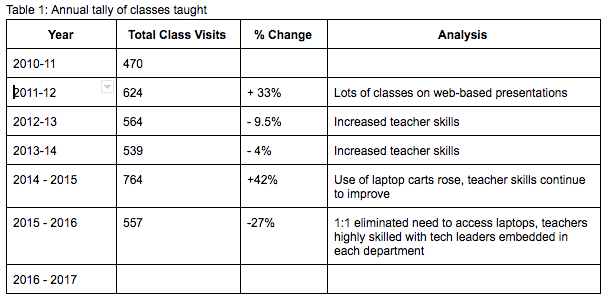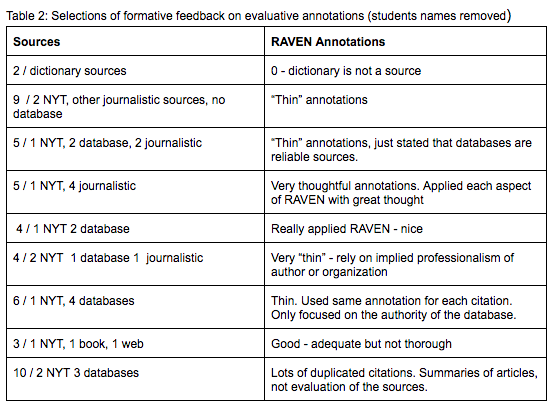In January 2014, during a weekly meeting of department chairs, our principal laid out some materials for College Board for anyone who was interested. There was a new initiative called AP Capstone that focused on inquiry and research skills. I was the only one interested. With the support of my principal I signed up for the pilot year and am now in the third year of this ambitious, exciting, exhausting program. Teaching AP Capstone changed my role in our high school from one of collaborator to teacher-of-record, and the impact of that shift has been profound. And it may have saved my job.

College Board developed the AP Capstone program in response to very specific feedback from colleges and universities that incoming students lacked skills in critical thinking, inquiry, and research. Capstone is comprised of AP Seminar which is a foundational class that teaches skills in argumentation, analysis, scholarly research and writing, and presentation (it is also the prerequisite for AP Research). The Seminar grade for College Board is made up of two “performance tasks” which are made up of papers and taped presentations, and a final AP exam. In our school Seminar is for juniors and interested seniors, but some schools offer it to sophomores as well. AP Research builds on the skills learned in Seminar, and students conduct a yearlong scholarly study on the topic of their choice. Their research must include a literature review and an authentic study that includes the selection of a methodology, coding analysis, and summary of findings. The final paper is approximately 25 pages and in the form of a five chapter dissertation. Students present their study and findings in a summative presentation and oral defense.
Training for these classes (Seminar and Research) include a one-week residential course offered in a variety of locations across the country. After initial training teachers are required to submit a syllabus for approval (a typical syllabus is 20-25 pages). In addition there are mandatory scoring webinars. All papers and presentations are scored locally by the teacher, and submitted to College Board for validation scoring. In the past the webinars took approximately 5-6 hours per course. This year it changed and was far more time consuming and high stakes. College Board recommended 12 hours per course. It took me about 27 hours of personal time to complete the training. Teachers who did not pass were mandated to take a live webinar. If they failed again their administrators were contacted and they were unable to score the work of their own students. Needless to say, this has been profoundly unpopular. Based on this experience I would advise schools interested in participating in AP Capstone to wait a year and see if they sort this out.
The Impact of Teaching Seminar and Research
Teaching this course has sharpened my research skills far more than I ever anticipated. The personal responsibility for the performance of my students required that I deeply invest myself into each of their inquiry approaches and provide all class instruction as well as personalized conferences to hone individual skills. Search, evaluation and citation were easy. I had to learn forms of argumentation, line of reason, and the Toulmin Method became my instructional rallying cry. An example of student topics:
AP Seminar Topics
- Artificial intelligence in modern manufacturing
- Non-market socialism in the post-industrial world
- Automation of the workforce and its impact on the US labor share
- Esperanto as a universal language
- Preserving endangered languages
- The commercial viability of urban farming
- The role of NATO in the Ukraine: Article 5
- A historical review of infectious disease: Policy recommendations for Ebola
- Employability skills and the US educational system
- Barriers to the widespread implementation of pre-school integration
The Good
I have always provided formative and summative feedback on class research bibliographies. That feedback is calibrated to the goals of the teacher, and has typically included checking for a balance of journalistic, web sites, and database sources, and the elements of the citation. Now I am far bolder in advising teachers on what to ask for, and providing them with the assessment skills to back it up. To illustrate the point, here is an example from a recent sophomore research project where the teacher asked me to evaluate students on their evaluation of their sources using the RAVEN evaluation protocol:
Being a teacher-of-record has changed my relationship with the faculty. The requests for collaboration are more specific now. I have had more requests to collaborate on restructuring and “freshening” long-standing research units, and brainstorm on new ones.
It has also changed my relationships with students. Writing college recommendations, having the unique experience of working with students for two years, engaging deeply with them throughout their inquiry process, has been a deeply profound experience. They come back from college interviews bubbling over because they could discuss their research and are thrilled to tell me how impressed the interviewer was, and how they appreciate that they are doing something different than their peers. The spillover of having them stop by to ask me to look over a paper for another class, or bring a friend by for help with a research assignment, has transformed my interactions because they are true academic partnerships.
The Bad
Because I am scheduled with classes twice each day my overall availability to work with other classes has decreased. Capstone requires a lot of in-class time to work on papers, research, and work on presentations. So far I have been able to juggle the workshop class time and conduct what I call “ninja” visits to classes. The other result is that I have developed a number of video tutorials for the basics, like setting up a NoodleTools account, basic citation, basic web and database searches. A teacher can assign the brief tutorial as homework and then I drop by and spend my time on the more advanced or nuanced issues. This change in practice has gone over well with teachers. Instead of the familiar request to “teach citation, web searches and databases, is 15 minutes enough time?” I have been able to flip instruction of the basics, improving the quality and caliber of my face-to-face time with classes.
Being a regularly scheduled classroom teacher also means grading, taking attendance, and dealing with the fallout, when it occurs. When students are out because of illness there is additional planning and coordinating with Guidance to keep them from falling too far behind. There is regular communication with parents, including the calls that aren’t fun to make. Chasing down students who are missing deadlines, preparing for and attending IEP and 504 meetings, these are just a few of the extras that eat away at the day. Teachers deal with this all the time, but they also have a lunch and at least 1 prep period during the day, and 1 duty which could be minding a study hall. School librarians are well skilled at inhaling lunch in 10 minutes or less, and the library is the duty that never goes away. I don’t have a prep period, so it is a very busy day with lots of catch up at home and on the weekends.
The Ugly
Scheduling is a nightmare. Our high school chose to schedule Capstone as an elective, but it does not come with a department-based credit. This puts a lot of pressure on who is able to take the class. The students who sign up really, really want this class, but it also means that they might not be able to try for the Engineering certificate, and it rules out their ability to participate in our school-within-a-school, Rivers and Revolutions. There is a lot of competition in our schedule, and as a result the Capstone classes have been (blessedly!) small. However, if it is under-enrolled the program could end. I worry about this a lot.
Reflecting on the Experience
Taking on AP Capstone was the right thing to do when I realized there was a drop off in my classes. It gave me the opportunity to learn something new, build curriculum, bring something new to my school and students, and it changed my conversations with teachers. Now that I faced grading, parents, and all that comes with that, we were colleagues on equal footing.
However, having two separate AP classes to prep each day has taken time away from my primary job as the school librarian. Squeezing it all in has been a challenge. I will teach both courses again next year, but am strongly advocating that AP Seminar get picked up by the English department so that it can count towards the required credits and the state requirement that students have one year of English each year. AP Research will stay with me as there is so much individual research support, and it truly reflects my content area and professional skill set.
Developing flipped curriculum has worked very well. This is an area I will continue to develop and grow, and my goal as librarian is to use it to ensure that all our students are guaranteed to get the basics of search and source evaluation. Whether it is AP Capstone or another course, I recommend that every school librarian seeks the opportunity to be a teacher-of-record for a research-based course. It is a great professional experience. And it might save your job.
If you are looking for more information here are two brief sources with good, concise insights:
Edwards, H. (2015, August 29). What Is AP Capstone? Should You Do It? Retrieved
April 6, 2017, from Prep Scholar website: http://blog.prepscholar.com/what-is-ap-capstone-should-you-do-it
Nevov, D. (2014, May 17). The Case Against AP Capstone. Retrieved April 6, 2017,
from The Spectator website: http://www.stuyspec.com/opinion/the-case-against-ap-capstone


